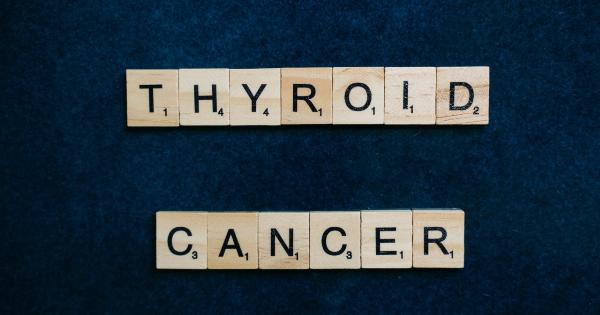Thyroid cancer is a type of cancer that affects the thyroid gland, a small butterfly-shaped gland located in the neck. The thyroid gland produces hormones that regulate metabolism and other bodily functions.
Thyroid cancer is relatively rare compared to other types of cancer, but it can still be a serious condition that requires medical treatment.
What Causes Thyroid Cancer?
Researchers don’t completely understand what causes thyroid cancer. However, certain factors may increase your risk of developing the condition, including:.
- Being female (thyroid cancer is more common in women)
- Exposure to radiation, especially during childhood
- Family history of thyroid cancer or other thyroid conditions
- Having certain genetic conditions, such as Cowden syndrome or multiple endocrine neoplasia type 2
What Are the Symptoms of Thyroid Cancer?
Many people with thyroid cancer don’t experience any symptoms at first. However, as the cancer grows, you may notice:.
- A lump or swelling in the neck
- Pain in the neck or throat
- Difficulty swallowing
- Hoarseness or other changes in voice
If you’re experiencing any of these symptoms, it’s important to see a healthcare provider for an evaluation. Keep in mind that these symptoms can also be caused by other conditions, so it’s not necessarily a sign of cancer.
Diagnosing Thyroid Cancer
If your healthcare provider suspects you may have thyroid cancer, they’ll likely order one or more tests to diagnose the condition. These may include:.
- Blood tests to check thyroid hormone levels and other markers
- Ultrasound to produce images of the thyroid gland and any lumps or nodules
- A biopsy, in which a small tissue sample is taken from the thyroid gland and examined to check for cancer cells
Based on the results of these tests, your healthcare provider can determine whether or not you have thyroid cancer and what type it is.
Treatment Options for Thyroid Cancer
The treatment for thyroid cancer depends on several factors, including the type and stage of the cancer, your overall health, and your personal preferences. Treatment options may include:.
- Surgery to remove all or part of the thyroid gland
- Radiation therapy to kill cancer cells
- Chemotherapy to kill cancer cells
- Targeted therapy to attack cancer cells with specific drugs
Your healthcare provider will work with you to determine the best treatment plan for your individual situation. In some cases, a combination of these treatments may be recommended.
Living with Thyroid Cancer
Being diagnosed with thyroid cancer can be stressful and overwhelming. However, there are several things you can do to help manage the condition:.
- Take any medications or treatments as prescribed by your healthcare provider
- Eat a healthy, balanced diet to support overall health and recovery
- Get plenty of rest and exercise regularly
- Join a support group or connect with others who have experienced thyroid cancer
It’s also important to attend all scheduled appointments with your healthcare provider and follow up with any recommended tests or check-ups.
Preventing Thyroid Cancer
Because the causes of thyroid cancer aren’t fully understood, it’s not always possible to prevent the condition. However, you can take steps to reduce your risk of developing thyroid cancer:.
- Avoid unnecessary exposure to radiation
- If you have a family history of thyroid cancer or other thyroid conditions, talk to your healthcare provider about screening options
- Attend regular check-ups with your healthcare provider to monitor for any changes or abnormalities in the thyroid gland
Conclusion
Thyroid cancer can be a serious condition that requires medical treatment. However, with prompt diagnosis and appropriate treatment, many people with thyroid cancer are able to manage the condition and lead healthy, fulfilling lives.
If you’re experiencing any symptoms of thyroid cancer or have concerns about your risk, talk to your healthcare provider for an evaluation.



























